非洲原住民的睡眠质量与高血压:COMBAT-CVDs 研究的横断面调查。
IF 2.7
4区 医学
Q2 PERIPHERAL VASCULAR DISEASE
引用次数: 0
摘要
高血压是全球心血管事件的主要风险因素,而非洲人的高血压与睡眠质量(SQ)的关系却鲜为人知。我们评估了尼日利亚伊巴丹成人睡眠质量与高血压的关系。我们在伊巴丹及其郊区逐户调查了心血管疾病风险因素(COMBAT-CVDs)研究的 3635 名参与者。SQ是自我报告的,SQ得分在该样本中按三等分分布分为良好("好")和较差("差")。本文章由计算机程序翻译,如有差异,请以英文原文为准。

Sleep quality and hypertension in an indigenous African population: a cross-sectional investigation from the COMBAT-CVDs study
Hypertension is a major risk factor for cardiovascular events worldwide, and little is known about its association with sleep quality (SQ) among Africans. We evaluated the association of SQ with hypertension among adults in Ibadan, Nigeria. In Ibadan and its suburbs, we identified 3635 participants in the door-to-door Community-based Investigation of the Risk Factors for Cardiovascular Diseases (COMBAT-CVDs) study. SQ was self-reported, and SQ scores were classified by the tertile distribution in this sample as good (<9), moderate (10–18), and poor (≥19), and hypertension was defined as one of the following conditions: systolic blood pressure ≥140 mmHg or diastolic blood pressure ≥90 mmHg or prior diagnosis by a certified health professional or current use of blood pressure-lowering drugs. Using good SQ as a reference, logistic regression models were used to estimate the multivariable-adjusted odds ratio and 95% confidence interval (CI) for odds of hypertension by tertiles of SQ scores in a two-sided test at p < 0.05. In all, 1182 (32.5%) had poor SQ, 903 (24.8%) had hypertension, and the mean(±SD) age was 35.3 ± 15.2 years in this sample. The multivariable-adjusted odds of hypertension by tertiles of SQ scores (using good SQ as reference) were OR: 1.13 (95% CI: 0.92, 1.38) for moderate SQ, and OR: 1.29 (95% CI: 1.05, 1.59) for poor SQ; P for trend = 0.06 after adjusting for relevant covariates. Poor SQ is associated with higher odds of hypertension in this sample. The imperative of culturally sensitive interventions to improve SQ would be promising in managing poor sleep-associated hypertension burden in this population.
求助全文
通过发布文献求助,成功后即可免费获取论文全文。
去求助
来源期刊

Journal of Human Hypertension
医学-外周血管病
CiteScore
5.20
自引率
3.70%
发文量
126
审稿时长
6-12 weeks
期刊介绍:
Journal of Human Hypertension is published monthly and is of interest to health care professionals who deal with hypertension (specialists, internists, primary care physicians) and public health workers. We believe that our patients benefit from robust scientific data that are based on well conducted clinical trials. We also believe that basic sciences are the foundations on which we build our knowledge of clinical conditions and their management. Towards this end, although we are primarily a clinical based journal, we also welcome suitable basic sciences studies that promote our understanding of human hypertension.
The journal aims to perform the dual role of increasing knowledge in the field of high blood pressure as well as improving the standard of care of patients. The editors will consider for publication all suitable papers dealing directly or indirectly with clinical aspects of hypertension, including but not limited to epidemiology, pathophysiology, therapeutics and basic sciences involving human subjects or tissues. We also consider papers from all specialties such as ophthalmology, cardiology, nephrology, obstetrics and stroke medicine that deal with the various aspects of hypertension and its complications.
 求助内容:
求助内容: 应助结果提醒方式:
应助结果提醒方式:


